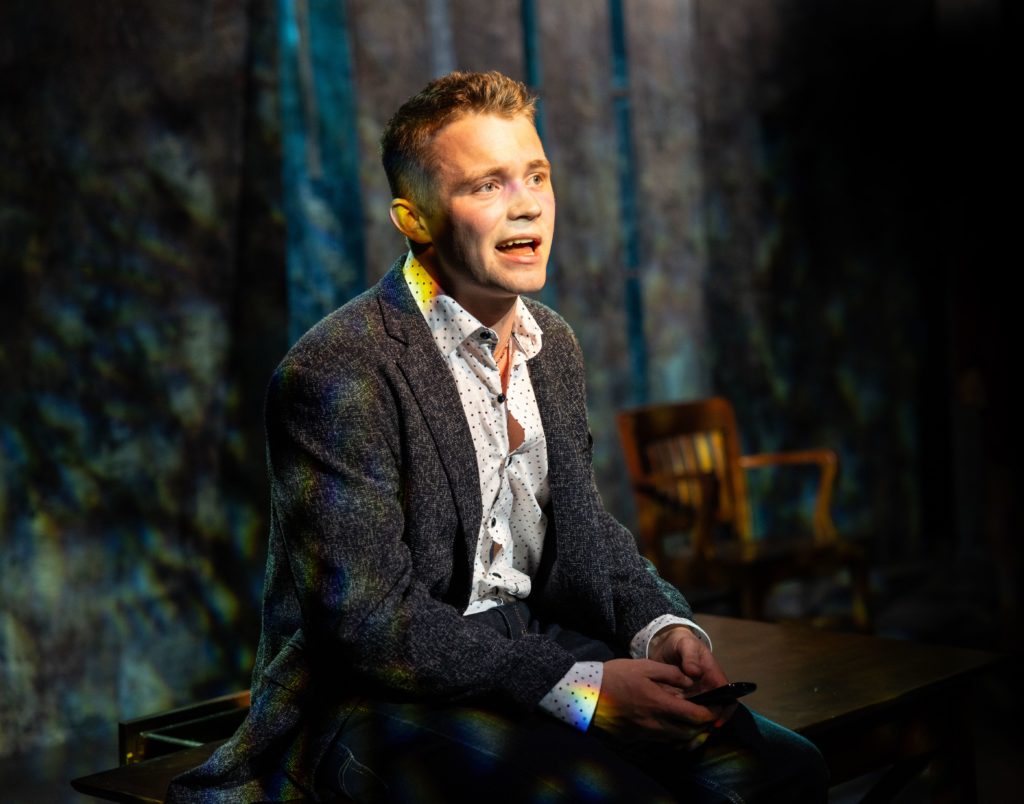By: Samuel L. Leiter
September 30, 2024: From February 28, 2022, to March 8, 2022, a 50-year-old Texas resident named Guy Wesley Reffitt was the defendant in a jury trial held before the United States District Court, District of Columbia. He was accused of five criminal counts for his participation in the January 6, 2020, insurrection at the U.S. Capitol, for which he pleaded not guilty. His accuser was his own 19-year-old son, Jackson, a community college student of political science, who reported his father to the FBI. Reffitt, the first person convicted for his activities on January 6, was found guilty on all counts, and was sentenced to seven years in prison.
The notion of a left-leaning son—who supported Bernie Sanders’s democratic socialist platform—turning on his own right-wing, firearm-packing father, whom he nevertheless professes to love, contains a built-in dramatic wallop, one that countless families riven by our divided nation can appreciate. It’s also a blow that Stephen Sachs has aimed at our political jaws by crafting a docudrama based strictly on the “court evidence, public statements, and the official transcript” of the trial in a production Sachs directed at Los Angeles’s intimate Fountain Theatre. That production, its creative and performing company intact, is currently at the City Center Stage II.

The show makes no attempt to recreate a courtroom. Joel Daavid’s set consists of a carpeted area equipped with a couple of wooden tables and chairs fronting an abstract background of irregularly shaped units resembling green and rust-tarnished metallic sculptures. Alison Brummer lights it all dramatically.
Four nameless characters appear, designated as U.S. Attorney (Anna Khaja), Defense Attorney (Larry Poindexter), Son (Patrick Keleher), and Father (Ron Bottitta). All are costumed by Danyele Thomas as you might imagine, the lawyers in business attire, the son in slacks, a sport jacket, and a white shirt, the father in black jeans and a black t-shirt before he shows up for the verdict in a baggy, brown suit.
Some scenes are staged in typical courtroom fashion, with the seated witness, the son, being questioned by one or the other attorney (the father never testified). Other scenes are in a neutral space where actions ostensibly described in the documents are fully reenacted. The dialogue—of which there is a good deal, drawn both from testimony and private conversations—presumably has been lifted verbatim from printed and recorded sources.

Now and then, offstage recorded voices are heard as part of Stuart Blackwood’s complex sound design. Most obvious are the obnoxious outbursts of Donald J. Trump, in whom one might say the disgruntled father—who turned sour after losing his important job, located in Penang, Malaysia, when the oil industry floundered—found God. Addicted to watching Fox, he joined a radical group called the Three Percenters and read, reread, and quoted, as if it were gospel, Trump’s ghost-written book, The Art of the Deal.
The facts of Guy Reffitt’s case and trial can be read in various sources, as for example here, so they needn’t be repeated. The production, however, rather than providing a straightforward trial drama, chooses to mix the familiar cross examination process with verbatim recreations of scenes between the son and father, which one assumes were documented from memory in interviews. Some of it likely comes from the son’s having recorded his father’s words on his phone, which we see him doing.

Whatever their source, the words are plentiful enough for fully written dramatic scenes, most of which tend to be intensely emotional, if not confrontational. There’s also extensive monologic material, especially for the father, whose reactionary tirades on behalf of taking over the Capitol, and his enthusiastic blow-by-blow description of what he was experiencing on January 6, are frightening in their furious, self-righteous rhetoric.
A great deal of fascinating expository information about the father and son dynamic, not to mention that of the family, emerges, some of which—including a GoFundMe account from which he earned a hefty payoff—doesn’t cast the son in the most pristine light. Regardless of the nuances, however, including Guy Reffitt’s reasons for becoming so deeply radicalized, nothing detracts from the depth of his beliefs or the actions he took before, during, and after the insurrection.

Unfortunately, too much of the performance is played with mad dog ferocity. The father’s raving, macho bombast, punctuated by moments in which he brandishes either his 40-caliber Smith & Wesson or his AR-15, allows Bottitta to demonstrate a powerful pair of lungs and the tour-de-force ability to maintain an attitude of high dudgeon over a significant stretch. While it’s an impressive demonstration of histrionic commitment, I felt like I needed a dose of ibuprofen to recover from the barrage of shouting, which felt like an audition for King Lear’s storm speech.
Khaja and Poindexter as the polished attorneys are much like those seen in countless courtroom dramas, determined, focused, crafty, and smooth. Keleher’s Son is both fragile and tough, although one wonders how even a devoted son could love so overtly fanatical a father. The son admits that he and his once well-liked dad used to have “a pretty great father/son relationship,” but we not only learn that Reffitt once held a gun to his wife’s head, we also watch as he threatens to kill his own son.

All in all, the show’s dependence on reenacted situations, with their sometimes excessive emoting, more than on courtroom process, creates something of a dramatic imbalance. On October 3, another Trump-related courtroom docudrama, this one on film, will be released, its subject the E. Jean Carrol sexual assault suit against Trump. I hope it sticks to the trial and, unlike Fatherland, leaves the reenactments to our imagination.
Fatherland ***
City Center Stage II
131 W. 55th Street, NYC
Through November 23, 2024
Photography: Maria Baranova






















